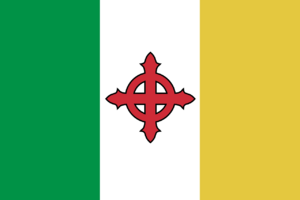Ebrarian people
Ebrarianos | |
|---|---|
 | |
| Regions with significant populations | |
| Ebrary | |
| Languages | |
| Ebrarese | |
| Religion | |
| Primarily Amendantism, but also Ebraro-Orthodox and other Christian denominations | |
| Related ethnic groups | |
| Gallasian people, Vorstish people, Aromance peoples |
Ebrarians are an ethnic group and nation native to Ebrary who speak the Ebrarese language. The Ebrarian identity originates in the Ebrarian city-states era from the 6th to 10th century. Their ethnonym is derived from the name of Marcus Ebraius, the Aroman general who founded the city of Ceres in 413 AD. The majority of the citizens of Ebrary are ethnic Ebrarians.
The Ebrarian population trace their lineage to the Ebraro-Celts who inhabited Ebrary before the arrival of Marcus Ebraius, and the various Aroman soldiers and migrants who came afterwards. The Aroman settlers founded a variety of city states in the southern portion of the modern country of Ebrary. After the city-states were conquered by the Vorsts, the Ebrarian people were united as a kingdom under native rule in the late 11th century. Some definitions of Ebrarian people include, while others exclude, people descended from later migration into Ebrary.
Relations to other people groups
Relation to Aromance peoples
Ebrarians continued to refer to themselves as Aromanos (Aromans) for centuries after the colonization of Ebrary. It was not until they were conquered by the Vorsts that the Aroman-descended inhabitants of Ebrary referred to themselves as a unique people group.
Laimiaic speakers
A large minority of Laimiaic speakers were among the Aroman colonists who settled Ebrary during the era of city-states. Over time, these communities were mostly assimilated into the larger Fragran-speaking population. However, small communities of Ebrarian Laimiaic speakers did not completely die out in the port cities of eastern Ebrary until well into the 19th century. As of the modern era, these groups have also been completely assimilated